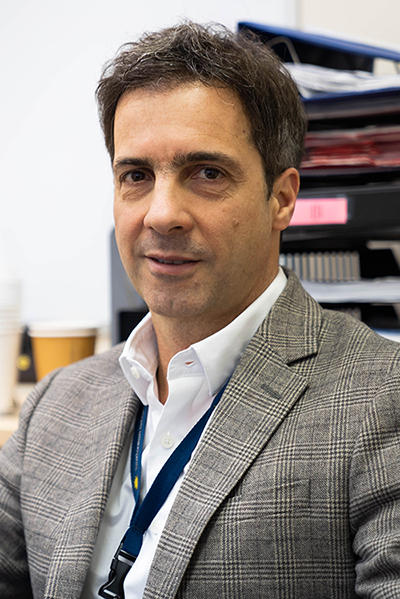What is the link between the brain and the heart?
 Dr. Luciano Sposato holds the endowed Kathleen & Dr. Henry Barnett Chair in Stroke Research. His recent research found that people who suffer a stroke are at significantly higher risk of heart attack within 30 days of the stroke. He is daring to ask the question; what is the link between the brain and the heart?
Dr. Luciano Sposato holds the endowed Kathleen & Dr. Henry Barnett Chair in Stroke Research. His recent research found that people who suffer a stroke are at significantly higher risk of heart attack within 30 days of the stroke. He is daring to ask the question; what is the link between the brain and the heart?
By Max Martin, MMJC’19
Asking questions and finding answers to things we don’t know is what drives Dr. Luciano Sposato.“There are always new questions to answer, and this is something that will never end,” he said.
As the Kathleen & Dr. Henry Barnett Chair in Stroke Research, Dr. Sposato is examining the link between the brain and heart. He has discovered that people who suffer a stroke are at significantly higher risk of a heart attack within 30 days of the stroke.
But questions as to why that is the case remain unanswered.
Dr. Sposato’s study showed that women and men with no underlying heart disease are more than 20 times more likely to have their first major cardiovascular event following a stroke. Now he’s investigating two hypotheses as to why this might be the case; the first is inflammation, and the second is the loss of the autonomic regulation the brain has on the heart.
“We want to discover how we can prevent heart complications in stroke patients by using a more novel approach than just controlling risk-factors,” Dr. Sposato said. “We are targeting the specific mechanisms by which patients get heart disease after stroke. It has the potential to really impact peoples’ lives.”
Born in Argentina, Dr. Sposato studied cardiac arrhythmia after stroke for many years at the Favaloro Foundation. Eventually, his interests expanded from just cardiac arrhythmia to include all stroke-related complications.
“I realized it was just a piece of the puzzle and not the overall big picture,” he said.
His desire to see things from different perspectives led him to pursue an MBA 13 years into his practice as a physician.
“As a physician, I was always open to other ways of thinking,” Dr. Sposato said. “That’s why I did an MBA. I wanted to know how the minds of other specialties or professionals were shaped. I learned during my MBA that when facing a single problem, it would be tackled very differently if you’re an engineer, a doctor or an accountant. It was amazing to learn how dissimilarly brains are shaped by diverse training environment.”
He maintains this philosophy today through his work in London, frequently attending rounds and meetings outside of his specialty. It’s an essential practice that Dr. Sposato says opens the mind to new opportunities and ways of thinking.
“The more you know, the more complex questions you get to answer,” he explained. “I like the challenge of having to design the research to answer a specific question. It’s not only identifying the knowledge gaps, but also thinking about how you’re going to answer that question efficiently.”
The time, resources and lab provided by the endowed Kathleen & Dr. Henry Barnett Chair in Stroke Research open up opportunities for Dr. Sposato and his team to answer these complex questions.
“I would not have been able to make discoveries without the Chair position, that is for sure,” he said. “It’s been immensely helpful. It gives me protected time, which is crucial. If there is something that is really valuable in research, it is time and attention to focus on what you are doing.”
For Dr. Sposato, the hope is that his stroke research will help improve outcomes for patients, and further inform clinical practice guidelines. And it’s that desire to keep pursuing answers to the unknown, and uncover more about the link between the brain and the heart, that motivates him daily.
“Research is like oxygen,” he said. “It’s something different every day. It lets me be creative and to collaborate with other people to expand our possibilities.”
 Daring to Ask is a series that profiles Canada Research Chairs and Endowed Research Chairs at Schulich Medicine & Dentistry. These researchers are advancing knowledge in their respective fields, asking and answering questions that challenge that status quo and seeking to improve patient care. It is essential research made possible by generous donors and the investment of funding agencies.
Daring to Ask is a series that profiles Canada Research Chairs and Endowed Research Chairs at Schulich Medicine & Dentistry. These researchers are advancing knowledge in their respective fields, asking and answering questions that challenge that status quo and seeking to improve patient care. It is essential research made possible by generous donors and the investment of funding agencies.








